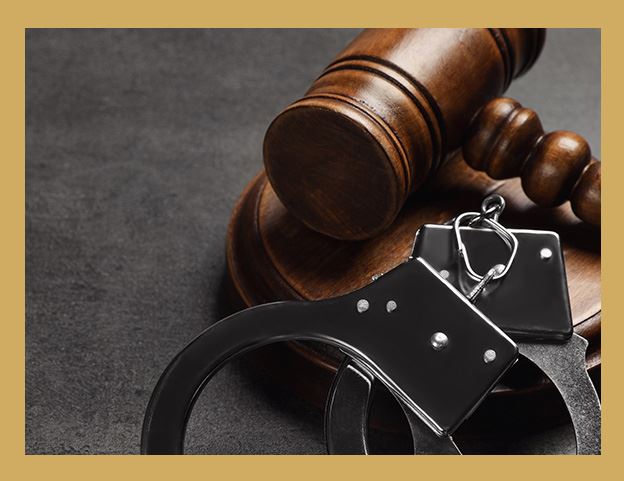

Advocating for the Accused

Bryan/College Station Drug Crimes Lawyer
Personalized Representation Against Drug Charges in Brazos County
If you have been charged with a drug offense in Texas, you should first consult an experienced defense attorney. Law enforcement will do all they can to seek answers that might further incriminate you, so it is best to only speak to someone once you have retained a lawyer. Attorney Donnie Andreski brings 20 years of experience as a police officer and former detective, and he has since been applying these skills in his work as a defense lawyer. When facing accusations for something as nuanced as a drug crime, having an advocate with investigative experience can prove advantageous to building an air-tight defense.
Are you facing drug charges in Texas? Call The Law Office of Donnie Andreski, P.C. today at (979) 356-3766 or contact us online to schedule a meeting with our Bryan drug crimes attorney!

Drug Schedule Scale
Federal law categorizes illegal drugs, or controlled substances, into five schedules based on their potential for abuse and risk. Schedule I includes drugs with the highest potential for abuse, and Schedule V includes those with the lowest potential for abuse. It is important to know which schedule of drugs your criminal charge involves, as the drug schedule largely determines the penalties you may face.
Some examples of drugs in their respective schedules are:
- Schedule I – heroin, PCP, marijuana, LSD, crack cocaine
- Schedule II – morphine, oxycodone, cocaine, Ritalin
- Schedule III – ketamine, codeine, Vicodin
- Schedule IV – Xanax, Valium
- Schedule V – cough suppressants with a certain amount of codeine
Drug Crime Charges in Texas
In Texas, drug crimes are classified into several categories based on the type and amount of drug involved, as well as the nature of the offense. Here are some of the most common drug crimes in Texas:
- Possession of a controlled substance: This is the most basic drug offense and involves knowingly or intentionally possessing a controlled substance without a valid prescription. The severity of the offense depends on the type and amount of drug in question.
- Possession with intent to distribute: This crime involves possessing a controlled substance and intending to sell or distribute it. The amount of drugs involved is usually higher than in a simple possession case.
- Drug trafficking: This involves the transportation, sale, or distribution of a large quantity of drugs. It is considered a more serious offense than possession or possession with intent to distribute.
- Drug manufacturing or cultivation: This involves the production or cultivation of drugs, such as growing marijuana or manufacturing methamphetamine.
- Prescription drug fraud: This involves obtaining prescription drugs through fraud or deception, such as forging a prescription or obtaining multiple prescriptions from different doctors.
- Driving under the influence of drugs: This is similar to a DUI for alcohol but involves driving under the influence of drugs.
If you are facing a drug charge, it's crucial to seek the advice of an experienced criminal defense attorney.
Texas Drug Penalty Groups
The Texas Controlled Substances Act penalizes drug offenses by grouping different schedules of drugs into penalty groups, ranging from Penalty Group 1 to Penalty Group 4. Each penalty group has specific statutes for the penalties associated with the amount of the drug and the type of offense (possession, manufacturing, delivery).
Penalty Group 1 (PG1) includes narcotics like opioids and opiates. PG1-A includes LSD and its salts and isomers, and PG2 covers most hallucinogens like ecstasy and PCP. PG2-A classifies penalties differently based on the weight for manufacture/delivery and the weight for possession. PG3 includes opioids and opiates not covered by PG1, as well as sedatives, anabolic steroids, and other prescription drugs with a potential for abuse. Lastly, PG4 includes others not covered in the above groups and a range of prescription medications with certain amounts of chemical compounds.
The penalties are too lengthy to list here, but take a look at Texas’ penalty groups table to find information related to your specific charges or alleged amount in possession.
What are the Penalties for Drug Crimes in Texas?
The penalties for drug crimes in Texas can vary depending on the specific offense, the amount and type of drug involved, and the defendant's criminal history. Here are some examples of the penalties for drug crimes in Texas:
- Possession of a controlled substance: This offense can be charged as a misdemeanor or a felony, depending on the type and amount of drug involved. A misdemeanor possession charge can result in up to 180 days in jail and a fine of up to $2,000. A felony possession charge can result in 180 days to 99 years in prison and a fine of up to $250,000.
- Possession with intent to distribute: This offense is a felony and can result in 2 to 99 years in prison and a fine of up to $10,000.
- Drug trafficking: This is a first-degree felony, and the penalties can include 5 to 99 years in prison and a fine of up to $250,000.
- Drug manufacturing or cultivation: This offense is also a felony, and the penalties can range from 180 days to life in prison and a fine of up to $250,000.
- Prescription drug fraud: This offense can be charged as a misdemeanor or a felony, depending on the amount and type of drug involved. The penalties can include up to one year in jail and a fine of up to $4,000 for a misdemeanor or up to 20 years in prison and a fine of up to $10,000 for a felony.
- Driving under the influence of drugs: This offense can result in up to 180 days in jail and a fine of up to $2,000 for a first offense, and the penalties increase for subsequent offenses.
It's worth noting that Texas has mandatory minimum sentences for some drug offenses, meaning that a judge is required to impose a certain minimum sentence, regardless of the circumstances of the case.
Understanding the Consequences of Drug Crimes
Navigating the legal landscape surrounding drug crimes can be overwhelming, especially when the stakes are high. Understanding the potential consequences of drug-related offenses is crucial for anyone facing charges. At The Law Office of Donnie Andreski, P.C., we believe that informed clients are empowered clients. Here’s a breakdown of what you may face if charged with a drug crime:
- Criminal Record: A conviction can lead to a permanent criminal record, affecting employment opportunities, housing applications, and more.
- Fines and Restitution: Depending on the severity of the offense, fines can be substantial, and you may also be ordered to pay restitution to victims.
- Incarceration: Drug offenses can carry significant jail or prison time, especially for repeat offenders or serious charges.
- Probation: In some cases, individuals may be placed on probation, which comes with strict conditions that must be followed.
- Impact on Family: Drug charges can strain family relationships and lead to custody issues if children are involved.
Understanding these potential consequences is the first step in building a strong defense. Our experienced legal team is here to help you navigate these challenges and work towards the best possible outcome for your case. Don’t face this alone—contact us today for a consultation.
Texas’ Marijuana Laws
Marijuana is adjudicated separately from the above penalty groups. Be aware that marijuana remains illegal in Texas regardless of its use, whether medicinal or recreational. The penalties for marijuana possession include the following:
- Less than 2 ounces – Class B misdemeanor punishable by up to 180 days in county jail and no more than $2,000 in fines
- 2-4 ounces – Class A misdemeanor punishable by up to 1 year in county jail and up to $4,000 in fines
- 4 ounces to 5 pounds – State Jail Felony punishable by up to 2 years in state jail and $10,000 in fines
- 5-50 pounds – third degree felony punishable by 2-10 years in state prison and up to $10,000 in fines
- 50-2,000 pounds – second degree felony punishable by 2-20 years in state prison and up to $10,000 in fines
- More than 2,000 pounds – first degree felony punishable by 5-99 years in prison and up to $10,000 in fines
The penalties will be more severe for crimes of manufacturing or delivery. Contact The Law Office of Donnie Andreski, P.C. for more information about your specific charges and potential penalties.
Defenses For Drug Crime Charges
If you have been charged with a drug crime, several defenses may be available to you depending on the circumstances of your case. Here are some possible defenses for drug crime charges:
- Unlawful search and seizure: If the police obtained evidence against you through an unlawful search or seizure, your attorney may be able to argue that the evidence should be excluded from your case.
- Lack of knowledge or intent: Some drug crimes require the defendant to have known that they were in possession of drugs or intended to sell them. This may be a valid defense if you did not know that the drugs were in your possession or did not intend to sell them.
- Prescription or medical use: If you were in possession of a controlled substance for which you had a valid prescription or were using it for medical purposes, this may be a defense.
- Entrapment: This may be a defense if you were coerced or induced by law enforcement to commit a drug crime that you would not have otherwise committed.
- Duress or necessity: This may be a defense if you committed a drug crime under duress or out of necessity, such as to protect yourself or others from harm.
It's important to note that each case is unique, and the available defenses will depend on the specific circumstances of your case.
Defending Your Rights: Our Approach to Drug Crime Cases
At The Law Office of Donnie Andreski, P.C., we understand that facing drug crime charges can be overwhelming and stressful. Our experienced legal team is dedicated to providing you with a robust defense tailored to your unique situation. We believe that everyone deserves a fair chance, and we are committed to protecting your rights throughout the legal process.
Here’s how we can help you:
- Thorough Case Evaluation: We start with a comprehensive review of the circumstances surrounding your case, including evidence, witness statements, and police procedures, to identify any weaknesses in the prosecution's argument.
- Strategic Defense Planning: Based on our findings, we will develop a personalized defense strategy that may include challenging the legality of the search and seizure, questioning the credibility of witnesses, or exploring alternative sentencing options.
- Expert Legal Guidance: Our team will guide you through every step of the legal process, ensuring that you understand your options and the potential outcomes of your case.
- Negotiation with Prosecutors: We are skilled negotiators who can advocate on your behalf to seek reduced charges or alternative sentencing, potentially minimizing the impact on your life.
- Trial Representation: If your case goes to trial, our attorneys will provide vigorous representation, utilizing our extensive courtroom experience to fight for your rights.
Choosing the right legal representation is crucial when facing drug crime charges. Let us help you navigate this challenging time with confidence. Contact us today for a free consultation and take the first step toward protecting your future.
Contact Our Bryan/College Station Drug Crimes Attorney Today
The Bryan/College Station drug crime attorney from The Law Office of Donnie Andreski, P.C., can look deeper into your charges to determine your best defense options. As a former detective and police officer, Attorney Andreski knows exactly what the prosecutors will look for to convict you so that he can strategize an effective defense to protect these weak points. Contact our frim today to get started!
Contact The Law Office of Donnie Andreski, P.C. online or call (979) 356-3766 today to schedule a FREE consultation with our drug crimes lawyer in Bryan/College Station!
-
Available 24 Hours a Day, 7 Days a Week
-
Direct Access to Attorneys From Start to Finish
-
Extensive Experience as a Police Officer & Detective

-
He was responsive, knowledgeable and above all honest.
- G.H. -
Always professional and very knowledgeable.
- J.V. -
Terrific guy and an excellent attorney.
- P.F. -
Very professional, knowledgeable, and easy to work with.
- Travis P. -
If you’re looking for an outstanding honest lawyer to represent you, Donnie Andreski is your man.
- J.A.



